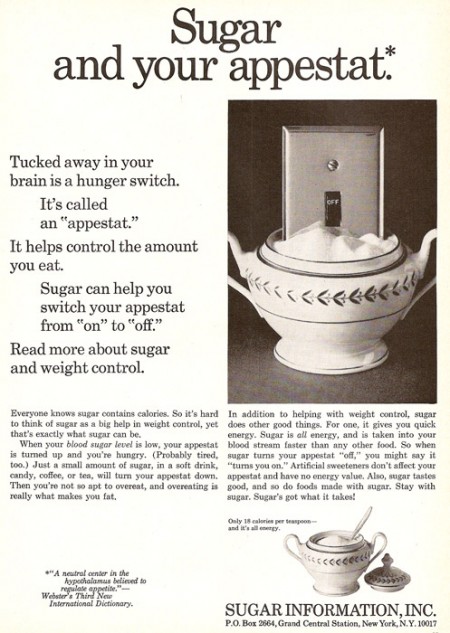This 1968 ad from Sugar Information, Inc. is laughable.

It reads:
Tucked away in your brain is a hunger switch. It’s called an “appestat.” It helps control the amount you eat. Sugar can help you switch your appestat from “on” to “off.” Read more about sugar and weight control.
Everyone knows sugar contains calories. So it’s hard to think of sugar as a big help in weight control, yet that’s exactly what sugar can be.
When your blood sugar level is low, your appestat is tuned up and you’re hungry. (Probably tired, too) Just a small amount of sugar, in a soft drink, candy, coffee, or tea, will turn your appestat down. Then you’re not so apt to overeat, and overeating is really what makes you fat.
In addition to helping with weight control, sugar does other good things. For one, it gives you quick energy. Sugar is all energy, and is taken into your blood stream faster than any other food. So when sugar turns your appestat “off” you might say it “turns you on.” Artificial sweeteners don’t affect your appestat and have no energy value. Also, sugar tastes good, and so do foods made with sugar. Stay with sugar. Sugar’s got what it takes!
Before you think this ad was an isolated incident, know that this was just one of an entire marketing campaign. Here are two other examples:
I don’t know who financed the Sugar Information, Inc. marketing campaign, but I have a sneaking suspicion it might have been people who SELL sugar. I doubt any doctors had anything to do with this information.
Sugar DOES affect my hunger. Unfortunately, simple sugars like the white sugar shown in the ad, cause a rebound effect. After I’ve eaten something loaded with sugar, I tend to want MORE sugar after about a half hour. I’ve noticed the same effect with artificial sweeteners as well.
I do much better with sugars found in fruit. I can eat an apple and be satiated for a couple of hours, but if I just swallowed a spoonful of the same amount of sugar that you find in an apple, I’m still hungry. It’s not the sugar that makes me feel full, it’s all the bulky stuff in the apple. Fiber and water satiate my appetite FAR more than sugar ever has.
What we see here is a clear example of marketing posing as health information. We see that a lot, even today. Remember that idea that 2-3 servings of milk every day help with weight loss? The study was sponsored by the Dairy Council and has never been repeated with the same results. And that three apples a day diet? Yeah, that was sponsored by the Washington Apple Growers Association.
The most important thing that we need to do when marketing is stronger than science is find what works for us. When you find a diet that makes you feel good, keeps your weight at a healthy level and leaves you with energy to spare, stick to it. You don’t need Sugar Information, Inc. to tell you what you should eat.
Advertisement via: vintage_ads: Sugar Information, Inc.
 Buy Walking Videos
Buy Walking Videos
 You would think it’s such an easy thing to do. Just ask for a to-go box before you finish your meal. Ask the server to bring the to-go box with your entree so you can eat half as much. Yeah, it sounds so easy.
You would think it’s such an easy thing to do. Just ask for a to-go box before you finish your meal. Ask the server to bring the to-go box with your entree so you can eat half as much. Yeah, it sounds so easy.



 I’m pretty excited about the news that Gold’s Gym has chosen Starling Fitness as one of its approved blogs. That might not sound like a big deal, but they’ve only chosen six blogs, so I’m feeling pretty happy about it. You can see the list here:
I’m pretty excited about the news that Gold’s Gym has chosen Starling Fitness as one of its approved blogs. That might not sound like a big deal, but they’ve only chosen six blogs, so I’m feeling pretty happy about it. You can see the list here:
